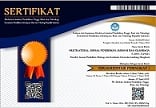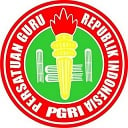Hubungan antara fear of negative evaluation dengan mental toughness pada atlet tenis lapangan
Abstract
Tujuan dari penelitian ini untuk mengetahui hubungan antara fear of negative evaluation dengan mental toughness kepada atlet tenis lapangan. Metode penelitian ini menggunakan pendekatan kuantitatif. Teknik sampel dalam penelitian ini yaitu non-probability sampling dengan menggunakan metode purposive sampling, yaitu atlet tenis lapangan yang aktif mengikuti pertandingan yang berada di Kalimantan Selatan sebanyak 60 subyek. Adapun teknik pengumpulan data menggunakan skala mental toughness dengan skala fear of negative evaluation. Tehnik Analisa yang digunakan menggunakan uji asumsi yang terdiri dari uji normalitas dan linearitas, serta uji hipotesis. Adapun hasil dari penelitian ini yaitu terdapat hubungan yang negatif serta signifikan antara fear of negative evaluation dengan mental toughness pada atlet tenis lapangan dengan koefisien (r) sebesar -991 yang menandakan kekuatan hubungan yaitu sangat kuat, dengan nilai (Sig.) sebesar 0,000. Hasil yang negatif memili makna semakin tinggi fear of negative evaluation maka semakin rendah mental toughness yang dimiliki atlet, begitu pula sebaliknya. Semakin rendah fear of negative evaluation maka semakin tinggi mental toughness yang dimiliki atlet.
Keywords
References
Alfian Rinaldy, Ikhsan, R. (2016). Tingkat Kecemasaan Atlet Bola Pon Aceh Tahun 2016. Ilmiah Mahasiswa Pendidikan Jasmani, 2(August), 304–313.
Ardini, F., & Jannah, M. (2017). Pengaruh Pelatihan Teknik Relaksasi Pernafasan Dalam Terhadap Competitive State Anxiety Pada Atlet UKM Bulu Tangkis Universitas Negeri Surabaya. Jurnal Psikologi Pendidikan, 4(2), 1–5.
Azwar, S. (2019). Metode penelitian psikologi. Pustaka Pelajar.
Ciptaningtyas, T. (2012). Program intervensi imagery untuk mengatasi kecemasan kompetitif pada atlet bulutangkis dewasa. Tesis. Depok : FPsi Universitas Indonesia.
Cowden, R. G. (2017). On the mental toughness of self-aware athletes: Evidence from competitive tennis players. South African Journal of Science, 113(1–2), 1–6. https://doi.org/10.17159/sajs.2017/20160112
Cowden, R. G., Fuller, D. K., & Anshel, M. H. (2014). Psychological predictors of mental toughness in elite tennis: An exploratory study in learned resourcefulness and competitive trait anxiety. Perceptual and Motor Skills, 119(3), 661–678. https://doi.org/10.2466/30.PMS.119c27z0
Cowden, R. G., Meyer-Weitz, A., & Asante, K. O. (2016). Mental toughness in competitive tennis: Relationships with resilience and stress. Frontiers in Psychology, 7(MAR), 1–9. https://doi.org/10.3389/fpsyg.2016.00320
Dharmawan, D. C. (2016). KECEMASAN MENGHADAPI PERTANDINGAN PADA ATLET FUTSAL. Skripsi. Fakultas Psikologi. Jurusan Psikologi. Universitas Muhammadiyah Surakarta, August.
Gucciardi, D. F., Gordon, S., & Dimmock, J. A. (2008). Towards an understanding of mental toughness in Australian football. Journal of Applied Sport Psychology, 20(3), 261–281. https://doi.org/10.1080/10413200801998556
Gucciardi, D. F., Gordon, S., & Dimmock, J. A. (2009). Development and preliminary validation of a mental toughness inventory for Australian football. Psychology of Sport and Exercise, 10(1), 201–209. https://doi.org/10.1016/j.psychsport.2008.07.011
Harsono. (1998). Coaching and Aspek-aspek Psikologi Dalam Coaching. CV. Tambak Keusuma.
Irwanto, & Romas, M. Z. (2019). Profil Peran Psikologi Olahraga Dalam Meningkatkan Prestasi Atlet di Serang-Banten Menuju Jawara. Prosiding Seminar Nasional IPTEK Olahraga, 2(1), 1–14.
Jalili, F., & Hosseini, S. (2011). Comparison of Personality Dimensions, Mental Toughness, and Social Skills of Female Students Athletes (Team-Individual) and Non-Athletes. Annals of Biological …, 2(6), 554–560. http://scholarsresearchlibrary.com/ABR-vol2-iss6/ABR-2011-2-6-554-560.pdf
Jelpa Periantalo. (2019). Penelitian kuantitatif untuk psikologi. Pustaka Pelajar.
Juniarta R W. (2020). Hubungan antara mental toughness dan motivasi berprestasi dengan kecemasan bertanding atlet taekwondo di jawa timur. Tesis. Surabaya: Fakultas Psikologi. Universitas 17 Agustus 1945 Surabaya., 000, 1–19.
Lin, Y. H., & Chen, C. Y. (2013). Masculine versus feminine sports: The effects of peer attitudes and fear of negative evaluation on sports participation among Taiwanese college students. Revue Internationale de Psychologie Sociale, 26(4), 5–23.
Martin, J. J., Craib, M., & Mitchell, V. (2008). The relationships of anxiety and self-attention to running economy in competitive male distance runners. Journal of Sports Sciences, 13(5), 371–376. https://doi.org/10.1080/02640419508732252
Mesagno, C., Harvey, J. T., & Janelle, C. M. (2012). Choking under pressure: The role of fear of negative evaluation. Psychology of Sport and Exercise, 12(2), 67–78. https://doi.org/10.1016/j.psychsport.2011.07.007
Nizam, M.A., Fauzee, O.M.S., & Samah, B. . (2009). The affect of higher score of mental toughness in the early stage of the league toward winning among Malaysian football players. Research Journal Of International Studies, 12(2), 67–78.
Putera, K. D., Yuniardi, M. S., & Masturah, A. N. (2020). Apa Saya Khawatir Karena Fear of Negative Evaluation? Sebuah Studi Pada Remaja. Mediapsi, 6(1), 17–25. https://doi.org/10.21776/ub.mps.2020.006.01.3
Putri, H. M. (2015). Analisis Faktor Risiko Fear of Negative Evaluation. Seminar Psikologi & Kemanusiaan, Psychology, 492–500.
Rahmawati, I. D. (2017). Url : Ojs.Unpkediri.Ac.Id 25. Jurnal PINUS, 3(1), 25–31.
Sari, R. M. (2013). Mental Juara Atlet Berprestasi (Studi Kasus Profil Mental Juara Mardi Lestari Sebagai Pelari Tercepat Asia Dekade 1986-1996). Jurnal Ilmu Keolahragaan, 12(2), 56.
Sugiono. (2019). Metode Penelitian Kuantitatif Kualitatif dan R&D. Alfabeta.
Watson, D., & Friend, R. (1969). “Measurement of Social-Evaluative Anxiety”: Erratum. Journal of Consulting and Clinical Psychology, 33(4), 448. https://doi.org/10.1037/h0020196
Weeks, J. W., Heimberg, R. G., Hart, T. A., Fresco, D. M., Turk, C. L., Schneier, F. R., & Liebowitz, M. R. (2005). Empirical validation and psychometric evaluation of the brief fear of negative evaluation scale in patients with social anxiety disorder. Psychological Assessment, 17(2), 179–190. https://doi.org/10.1037/1040-3590.17.2.179
Zulkarnaen, A. A., & Rahmasari, D. (2013). Hubungan antara self-efficacy dan optimisme dengan kecemasan pada atlet beladiri aikido. Character, 2(2), 1–7.
DOI: http://dx.doi.org/10.20527/multilateral.v21i2.13454
Article Metrics
Abstract view : 1254 timesPDF - 768 times Similarity Check - 229 times
Refbacks
- There are currently no refbacks.
Copyright (c) 2022 Multilateral : Jurnal Pendidikan Jasmani dan Olahraga

This work is licensed under a Creative Commons Attribution-ShareAlike 4.0 International License.
Tools:
Indexed by:

Multilateral : Jurnal Pendidikan Jasmani dan Olahraga is licensed under a Creative Commons Attribution-ShareAlike 4.0 International License.

















